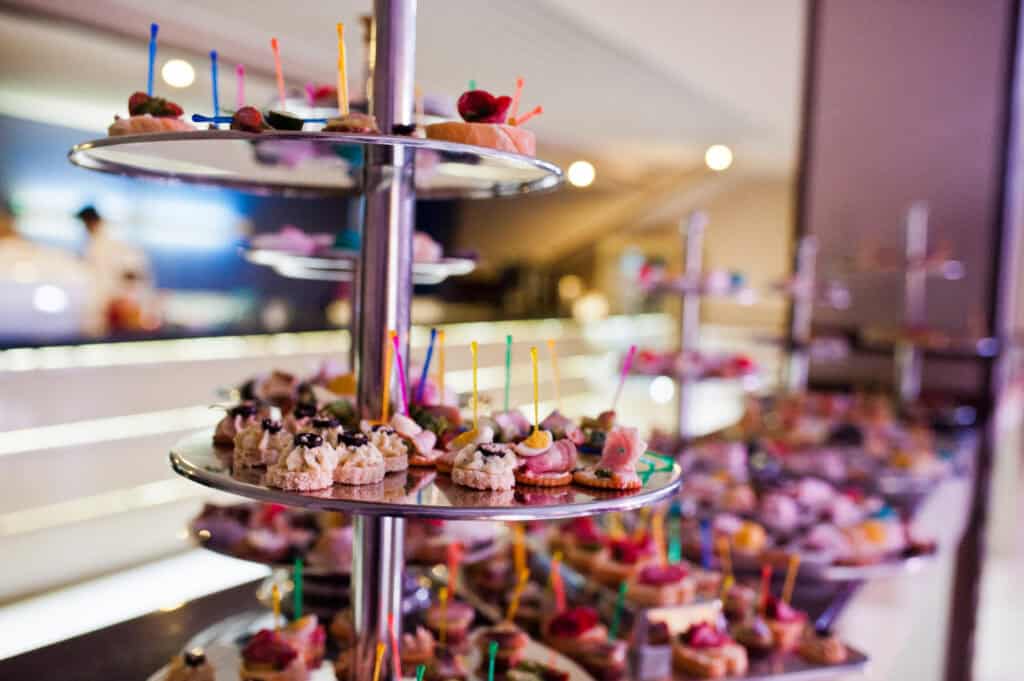
By Jermaine Thomas March 3, 2025
Large-scale event catering is a complicated process that needs careful preparation, a skilled catering staff, and flawless execution. Large-scale catering involves much more than just cooking delectable meals for events ranging from festivals and gala dinners to weddings and business meetings. Event planning, managing the catering staff, and guaranteeing excellent catering efficiency are all part of this dynamic process.
Whether you are a catering professional or simply curious about how large-scale events are managed, this guide will give you valuable insights.
Understanding the Scope of Large-Scale Catering
Large-scale catering differs significantly from small private events or restaurant dining. The key aspects that define large event catering include:
- High Volume of Guests – Serving hundreds or even thousands of guests within a fixed timeframe.
- Diverse Menu Planning – Creating a menu that caters to various dietary preferences and restrictions.
- Logistical Coordination – Managing the transportation of food, kitchen equipment, and serving staff.
- On-Site Setup and Execution – Setting up buffet stations, bars, and service counters efficiently.
- Strict Timing and Coordination – Ensuring all meals are served hot and fresh without delays.
The Importance of Proper Planning
Proper planning is the backbone of successful catering for large events. It involves:
- Estimating the food quantities required based on guest numbers.
- Coordinating with event organizers and venue managers.
- Setting up contingency plans for unforeseen circumstances.
By focusing on these aspects, caterers can minimize errors and ensure smooth food service operations.

Logistics: The Backbone of Large-Scale Catering
Menu Planning and Procurement
One of the most important aspects of event planning is menu selection. A menu that strikes a balance between dietary requirements, guest preferences, and ease of large-scale preparation must be planned by the catering staff. The key factors include:
- Ingredient Sourcing – Procuring fresh and high-quality ingredients in bulk.
- Storage and Transport – Ensuring perishable items are stored and transported safely to maintain freshness.
- Pre-Preparation – Preparing certain food elements in advance to reduce cooking time on the event day.
Transportation and Setup
Transporting food and kitchen equipment to the event venue requires careful coordination. A successful transport strategy includes:
- Using temperature-controlled vehicles to prevent spoilage.
- Properly packing food items to avoid spillage and damage.
- Allocating separate vehicles for different food categories to streamline unloading and setup.
Once at the venue, the catering team quickly sets up stations, ensuring everything is positioned for an efficient workflow.
Kitchen and Service Workflow
Large-scale catering frequently calls for a makeshift or mobile kitchen. The process is divided into:
- Food Preparation Zones – Separate sections for cooking, plating, and garnishing.
- Assembly Line System – Ensuring smooth coordination between chefs, servers, and support staff.
- Sanitation and Safety Measures – Maintaining cleanliness to comply with health regulations.
By streamlining these operations, caterers maximize efficiency and minimize errors.
Staffing: Managing the Catering Team Effectively
Roles and Responsibilities in Large-Scale Catering
A well-structured catering team is essential for smooth execution. Some key roles include:
- Head Chef and Sous Chefs – Oversee menu preparation and kitchen operations.
- Kitchen Assistants – Handle chopping, cooking, and dish assembly.
- Servers and Waitstaff – Ensure timely food delivery and guest assistance.
- Bartenders and Beverage Staff – Manage drink stations for alcoholic and non-alcoholic beverages.
- Logistics Coordinators – Handle transportation, inventory, and supplies.
- Event Managers – Supervise the entire operation and troubleshoot issues on-site.
Each team member plays a crucial role in ensuring catering efficiency during large-scale events.
Training and Coordination
Catering teams undergo rigorous training to ensure seamless service. The training includes:
- Speed and Efficiency Training – Preparing and serving large volumes of food within tight deadlines.
- Guest Interaction Skills – Ensuring professional and courteous service.
- Problem-Solving and Crisis Management – Handling unexpected challenges without disrupting the event.
A well-trained team enhances the overall dining experience and maintains the reputation of the catering company.
Managing Shifts and Workloads
Planning shifts strategically is necessary when staffing a big event. To keep up high service standards and prevent exhaustion:
- Rotational shifts are scheduled to give breaks to kitchen and service staff.
- Sufficient backup staff is on standby to handle last-minute changes.
- Clear communication channels are established to ensure coordination among teams.
By optimizing staffing and workload distribution, catering teams maintain high performance throughout the event.
Efficiency: Ensuring Smooth Food Service Operations
Time Management and Scheduling
The ability to maintain exact timing is one of the largest challenges in large-scale catering. Efficient scheduling involves:
- Preparing mise en place (pre-prepared ingredients) in advance.
- Setting up food stations before guests arrive.
- Implementing real-time coordination between chefs and servers.
Well-executed time management ensures food is served fresh, hot, and on schedule.
Technology in Large-Scale Catering
Modern catering businesses utilize technology to improve catering efficiency. Common technological solutions include:
- Event Management Software – Helps in planning logistics, scheduling staff, and tracking orders.
- Digital Ordering Systems – Reduces human error in meal customization and portioning.
- Mobile Kitchen Equipment – Allows food to be cooked or reheated on-site efficiently.
Technology enhances workflow, reduces waste, and improves overall service quality.
Maintaining Food Quality and Safety
In large-scale catering, food safety and quality are crucial. The following actions are taken to guarantee safety:
- Adhering to strict hygiene standards in food preparation.
- Regular temperature checks to keep food at safe levels.
- Implementing allergen control measures for guest safety.
Following these best practices prevents foodborne illnesses and ensures guest satisfaction.

Challenges and Solutions in Large-Scale Catering
Common Challenges Faced by Caterers
Despite careful planning, large-scale catering presents challenges such as:
- Last-Minute Guest Changes – Unexpected increases or decreases in guest numbers.
- Weather-Related Issues – Outdoor events facing rain, wind, or extreme heat.
- Equipment Malfunctions – Breakdown of cooking or refrigeration units.
- Guest Complaints and Special Requests – Handling unexpected dietary needs or preferences.
How Caterers Overcome These Challenges
- Having Extra Ingredients and Staff – Preparing for guest fluctuations.
- Backup Equipment and Power Supply – Ensuring uninterrupted operations.
- Weather Contingency Plans – Tents, heating lamps, and alternative serving areas.
- Quick Response Team – Dedicated staff to handle guest concerns promptly.
By proactively addressing these challenges, caterers can ensure smooth execution even under unexpected circumstances.
Conclusion
Large-scale event catering requires a careful balancing act between efficiency, staffing, and logistics. Every aspect of providing a flawless experience, from menu planning and transportation to team coordination and service execution, needs to be carefully handled. In addition to culinary proficiency, large-scale catering calls for flexibility and excellent event management abilities. Even the most difficult big events can be handled by caterers with the correct preparation, skilled team management, and technology assistance. Whether you are an event planner or a professional caterer, knowing these important details will help make guests’ dining experiences unforgettable.
Caterers can maintain high-quality service while managing the challenges of large-scale events by concentrating on catering efficiency and streamlining food service operations.